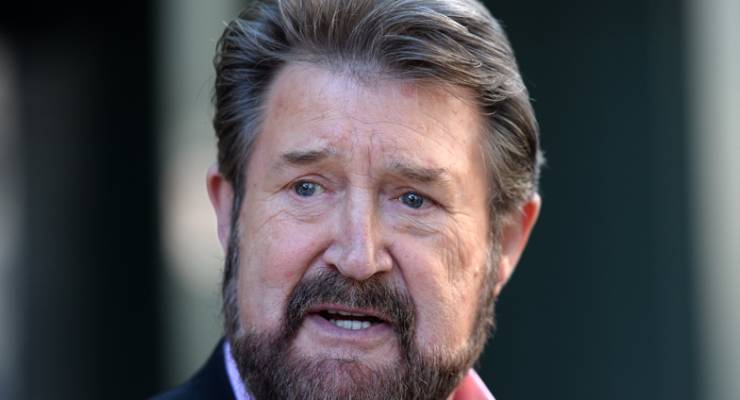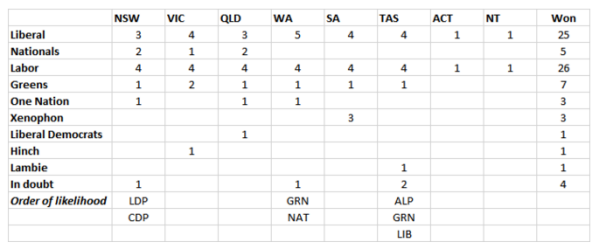
Now that things are winding down, some overdue consideration to the Senate, with a table at the bottom outlining where I perceive things to stand.
New South Wales
If preferences don’t change the order, the result will be Coalition five, Labor four and one each for the Greens, One Nation and the Liberal Democrats. However, the Liberal Democrats just barely have their nose ahead of the Christian Democrats, which could potentially be reversed on preferences. Analysis of below-the-line votes from 2013 shows strong performances on preferences for both Liberal Democrats and Christian Democrats, but the Liberal Democrats would have the edge if nearly half of Labor’s voters follow the how-to-vote card, as they traditionally do for the lower house. Labor directed a sixth preference to the Liberal Democrats, and would have about 0.1 quotas distributed as preferences upon the exclusion of their fifth candidate. So it would seem that David Leyonhjelm is well placed to win the 12th spot.
Victoria
The Coalition and Labor have enough full quotas to elect four each, the Greens have one, and Derryn Hinch is close enough that he’ll clearly win the 10th seat. That leaves the following contending for the last two seats: Greens #2 (0.39 quotas), Coalition #5 (0.34 quotas) and One Nation (0.23 quotas). Nothing in the past record of preference behaviour says One Nation will close the gap, so I think we can call this Coalition 5, Labor 4, Greens 2, Hinch 1.
[For the last time: yes, Derryn Hinch is eligible to run for the Senate]
Queensland
On full quotas, the Coalition elects four, Labor elects three and One Nation elects Pauline Hanson, while the Greens are close enough to a quota that Larissa Waters is assured of re-election. The front-runners for the other three seats are Coalition #5 (0.57 quotas), Labor #4 (0.49 quotas) and Liberal Democrats (0.35 quotas), unless Family First (0.25 quotas), Nick Xenophon Team (0.25 quotas) or the second One Nation candidate (0.17 quotas) achieve something extraordinary on preferences.
Western Australia
There are full quotas for five Liberal, three Labor and one Greens, with Labor #4 (0.70 quotas) and One Nation (0.50 quotas) assured of the next two spots. That leaves the last seat as a contest between the Nationals (0.34 quotas) and Greens #2 (0.33 quotas). The Nationals were outperformed by the Greens on below-the-line preferences in 2013, and the Liberals have very little to bequeath them in the way of a surplus, so the Greens seem the more likely winner at this stage unless their primary vote weakens significantly in late counting.
South Australia
A fairly clean result here, with four Liberal, three Labor and two NXT are elected off the bat, and NXT #3, Greens #1 and Labor #4 to follow shortly after.
Tasmania
The most fascinating contest is in Tasmania, given the very large number of major party voters who have gone below-the-line to give their votes to fifth-placed Liberal Richard Colbeck and sixth-placed Labor candidate Lisa Singh, who had been shafted by party powerbrokers in contentious preselection decisions. Ticket votes should be enough to elect the top four candidates on both Labor and Liberal tickets, with lead Greens candidate Peter Whish-Wilson and Jacqui Lambie also assured of seats, leaving two up for grabs at the end. Singh’s share of the Labor vote means that she rather than fifth-placed John Short will survive to the later stages of the count, and potentially emerge with Labor’s fifth seat.
[Pssst, Abetz: GetUp is not a charity, does not care what you think]
Colbeck’s vote may less consequential, since he holds fifth position on the ticket in any case, and would be just as well placed if most of his supporters had voted Liberal above the line. However, there is a potential scenario in which both Colbeck’s personal vote allows him to remain in the count concurrently with the fourth Liberal candidate long enough so that either McKim or Singh drops out ahead of them both, so that a fifth Liberal is elected at the expense of a fifth Labor or a second Greens. Such a result would deliver the Liberals a perverse benefit from giving Colbeck a low spot on the ticket and ensuring he received a vote base of his own.

*This article was originally published at The Poll Bludger








NSW
If Labor voters closely follow HTV cards, wouldn’t the preferences be distributed to the Greens first, who are slightly short of a quota and #2 in the HTV, before distributing any remaining ones to LDP at #6?
Are these “ABC figures” – they’ll decide this election won’t they?